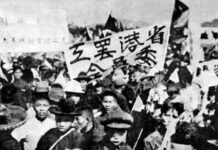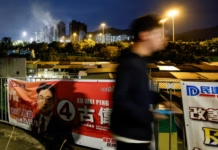Kobumi is an organisation of migrant workers formed to fight abuses by hiring agencies
Vincent Kolo of chinaworker.info met Ilalang Victoria and Iis, two activists in Kobumi, an organisation for Indonesian migrant workers in Hong Kong. Kobumi (Komunitas Buruh Migran – Migrant Workers’ Community) was founded in November 2014.
“First we came together with victims of the agencies, victims of overcharging,” they explain.
“We organised protests to the agencies and we won the case.”
Since then, Kobumi activists have been meeting every Sunday in a park to organise their activities. From a small handful their numbers have grown and on International Women’s Day, they held a colourful demonstration in Causeway Bay with dozens of participants including music and performances.
When I met them, Ilalang Victoria and Iis have just returned from a protest outside Indonesia’s Consulate in Hong Kong. Kobumi organised the protest against the government of president Joko Widodo refusing to revoke approval for a cement factory in Rembang, Central Java, which has driven farmers from their land and caused widespread environmental damage. The Rembang struggle is typical of many breaking out across the vast country, with Southeast Asia’s widest wealth gap and increasing attacks on workers and the poor majority.
The death of a woman protester from the Rembang struggle triggered solidarity actions including in Hong Kong. The protests were coordinated by the left political alliance PPRI (Indonesian People’s United Resistance) which Kobumi belongs to.

Trapped by the agencies
In Hong Kong, Indonesian migrants are trapped by government policies favouring the agencies, private companies which have a long record of overcharging and other illegal practises.
“Ultimately, we want the abolition of the agencies, but for now we are fighting for migrant workers to have the right to choose direct hiring [without using an agency] if they want this,” says Ilalang Victoria.
The Indonesian government’s policy forces migrant workers to use an agency, they explain, only allowing direct hiring in cases where an old contract is renewed.
“It’s a fake concession,” says Iis. “It only applies if it’s the same contract and employer, but if you change the employer you must use an agency.”
“So this is not going to help to solve the problem of overcharging – the exploitation is not going to stop,” Ilalang Victoria adds.
We discuss health and safety issues, with migrants exposed to physical mistreatment and even sexual harassment. This was highlighted in the case of Indonesian migrant Erwiana in 2014.
“These problems come up because of the live-in rule [in Hong Kong migrant domestic workers are required by law to live with their employer]. But nowadays migrant workers are more brave,” says Ilalang Victoria.
Major publicity surrounding the case of Erwiana and others, and crucially the mass protests against this violence, have raised the confidence of migrant women in Hong Kong.
“If this happens now the migrant worker directly calls to activist organisations like ours for help,” says Iis. “So we can monitor this.”
Is it because migrants are more aware of their rights, I ask.
“Yes, and we don’t expect the Indonesian Consulate to do much about this. It’s our duty as migrant workers,” she says.




